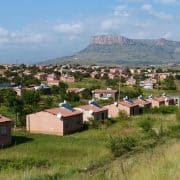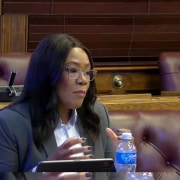|
Getting your Trinity Audio player ready...
|
The local municipality of Ditsobotla in the North West’s Ngaka Modiri Molema District has made news headlines over the past few months for the wrong reasons. From being placed under administration in September 2022, to its financial challenges leading to failure in paying contract workers’ salaries – the latter problem led to said workers invading the municipal offices, retrieving official documents, and leaving these strewn across the street in protest.
Most recently, the focus turned to EFF members who led a clean-up campaign in the area, an initiative of potential political opportunism, but nevertheless a sign of the municipality’s failure to carry out one of its most basic services: refuse management.
A hung municipality after the last local government elections of November 2021, Ditsobotla remains without a mayor, having gone through several false starts amid several coalition discrepancies. It was in fact the butt of jokes on social media after the elections, for having not one, but two mayors, both from the ANC and allegedly serving the interests of warring factions in the region.
As a local authority, Ditsobotla serves a population of just under one million, according to municipalities.co.za, with manufacturing and retail being two of its biggest economies. You would think this renders it manageable, and that efficacy in its leadership is guaranteed.
But such is the reality of South Africa’s local government sector, that small does not necessarily mean well managed, neither does affluence, as we have witnessed with the dysfunctionality of metros. Water and electricity supply crises have strained Gauteng’s metros in the last year or so, while coalition politics have revealed the ugly power struggles in political parties.
Political interests come first
Back to Ditsobotla. When news crews touched base with locals over the course of the town’s different tribulations, poor or lack of service delivery came up as a serious concern. At some point in December last year, by-elections were held that also informed the changes in coalition arrangements. Around the same time, the community went through devastating water shortages, and it soon became clear that voting was a lesser priority than securing water. One resident told the media that the municipality is that only in name, and that nothing is done to improve the lives of residents, because for those in power, political interests trump public interests.
These are no doubt signs of dysfunctionality, and for residents of Lichtenburg, which falls under the Ditsobotla Local Municipality, the realities of poor service delivery are here to stay. North West premier Bushy Maape made a candid comment during the recent Sona debate in Parliament regarding big business dis-investing in the area. Dairy company Clover, said Maape, did not leave Lichtenburg recently because of poor political leadership as has been widely reported, but because the company could not make their business model work in the area. His comments surely offer little comfort to some 300 locals who had been employed by Clover, and would now be added to the unemployed list.
But dysfunctionality does not just happen overnight, nor does it happen in isolation. The case of Ditsobotla, sad as it is, is an indication of lack of focus in good governance and the basic standard of service delivery in the best way possible, with the resources at hand.
Auditor-General Tsakani Maluleke has repeatedly highlighted the need for municipalities to be consistent in their financial management for municipalities, and to uphold the principle of accountability, to protect public resources. It is only when those resources are put to good, efficient use that residents will receive reliable, consistent services. A response that her office gets often from poorly performing municipalities is that they find it hard to attract and retain the right skills for the financial management element of their work. This may be true in many cases, but it cannot be the reason all the time, not with organisations like South African Local Government Association meant to support municipalities in skills development.
Maape, continuing with his speech in Parliament, had this to say of the Ditsobotla situation: “When we realised that there were problems, we formed a task team that worked with business and succeeded to tar roads there, not even using municipal money, but using contributions from business. They even repaired 40 traffic lights.”
That statement is far from reassuring, nor does it take responsibility, given that his province was recently reported in the media to have underspent by R1-billion in the last financial year, having to return funds to National Treasury. Why is business, which is fundamentally part of the tax-paying network already, expected to fund emergency repairs to roads and road infrastructure in a town that has a municipal manager and supporting staff?
Billions allocated but not used efficiently
Local government in South Africa has been in trouble for some time, but it cannot be that residents have to pay the price for poor financial management, corruption, and political interference, without any accountability from those in charge. In a country as dynamic as ours, the plight of local municipalities often has to compete for big news space with national and provincial politics. By the time our attention is drawn to the suffering communities on the outskirts of the economic hubs of our country, things have gotten so out of control that they require urgent action.
Maluleke notes in the 2020/21 MFMA report: “The lack of improvement in municipal [audit] outcomes is an indictment on the entire local government accountability ecosystem, which failed to act and arrest the decline that continued to be characterised by service delivery challenges in municipalities.”
Finance Minister Enoch Godongwana announced in his 2023 budget speech that local government allocations would increase by R14.3-billion – R8.1-billion for the local government equitable share, and R6.2-billion for direct conditional grants.
For the current period alone, local government will be funded to the tune of R522-billion. Whether this amount will be proportionally spent for the efficient delivery of services remains to be seen, not only in the audit reports that will come from Maluleke’s office at reporting period, but also when communities such as Ditsobotla once again make it on to the media’s radar.








